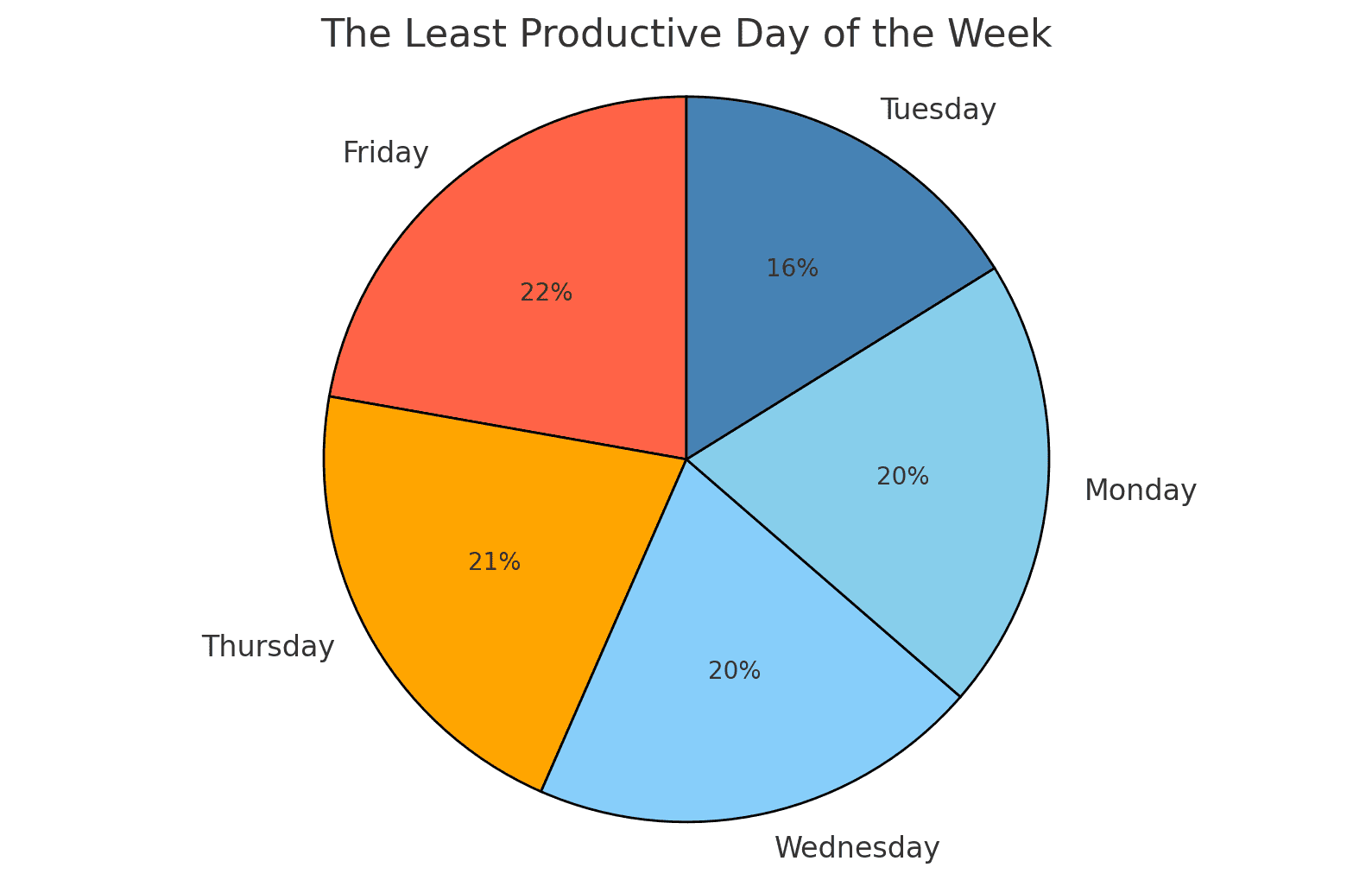Each week, the days go by, and many of us wonder when are we most productive.
Is it on Monday, the beginning of the week, when everything seems to restart?
Wednesday, midweek, when priorities are clear?
Or perhaps Friday, the day of the famous “last-minute productivity” before the weekend?
According to various studies, there are indeed times of the day and days of the week when work productivity peaks. Let's explore the factors that influence this dynamic.
Factors Influencing Productivity
It is essential to understand that work productivity is not constant throughout the day or week. Several production factors can influence it, including:
- Biological rhythm: our internal clock, or circadian rhythm, impacts our energy levels.
- Work environment: interruptions, noise, or even personal time management greatly affect productivity.
- Cognitive overload: an accumulation of unfinished tasks can reduce our ability to focus.
Moreover, distractions, especially social media, can hinder productivity. Distractions usually occur at the end of the day when fatigue sets in.
The Most Productive Day According to Studies
According to a study by Redbooth on more than 200,000 tasks, Tuesday is the most productive day of the week. Indeed, employees complete around 20% of their weekly tasks on this day, compared to just 11% on Friday. This phenomenon can be explained by the fact that on Tuesday, employees are fully engaged in their missions, after a Monday often dedicated to updating projects and priorities.
However, overall productivity decreases as the week progresses. On Friday, employees tend to focus on administrative tasks or follow-ups before wrapping up the week. This trend has been observed across various industries and countries, showing a strong correlation between the day of the week and high productivity.
| Day of the week | Average productivity |
|---|---|
| Monday | 16% |
| Tuesday | 20% |
| Wednesday | 18% |
| Thursday | 17% |
| Friday | 11% |
Conversely, Friday is often the day when we are least productive. Although we accomplish a large number of tasks on this day, they are usually of low added value, as revealed by a study conducted by Zety.

The Most Productive Times of the Day
Work productivity also varies depending on the time of day. According to economic sciences, our attention level peaks in the early morning, around 10 am, then drops before lunch and rises slightly in the early afternoon.
A study from the University of California shows that the time slots from 9 am to 11 am are the most conducive to tasks requiring concentration, such as project management or making complex decisions. In contrast, the afternoon is often reserved for meetings and less cognitively intensive activities.
The Effects of Fatigue at the End of the Day
Fatigue plays a significant role in long-term productivity. At the end of the day, between 4 pm and 6 pm, many experience a drop in energy, making it difficult to complete complex tasks. It is also at this time that social media and other distractions are most tempting. To increase productivity, it is advisable to organize your schedule according to these energy fluctuations.
How to Change Habits for Maximum Productivity
To increase productivity at work, some habits can be changed. Here are a few strategies:
- Schedule important tasks in the morning: this is when you are most alert.
- Use time management techniques: the Pomodoro technique, for example, involves working in 25-minute intervals followed by short breaks, helping maintain high concentration throughout the day.
- Avoid digital distractions: set specific times to check your emails and social media so as not to scatter your attention during key moments.
- Take regular breaks: several studies show that short breaks increase overall productivity throughout the day.
Examples of Successful Time Management
Take the example of a freelancer using Modul' to organize their days. Thanks to the integrated calendar feature and to-do lists, they can structure their work efficiently, avoiding juggling between different applications. Access to tools like mind mapping also helps them prioritize projects and get an overview, maintaining a high level of productivity even at the end of the week.
Long-term Benefits of Good Organization
In the long term, optimized management of workdays and work time helps reduce mental load and improve overall productivity. Studies show that companies promoting flexible scheduling while encouraging regular breaks see a 10 to 15% increase in productivity per year.
Thus, by adopting methods such as priority-based organization and using tools like Modul', it is possible to optimize each day and boost long-term productivity.
And you, what is your favorite day of the week to work?
Sources:
- Redbooth Study: This study on over 200,000 tasks revealed that Tuesday is the most productive day of the week.
Source: Redbooth
- University of California: A study showing that time slots from 9 am to 11 am are the most productive for tasks requiring intense concentration.
Source: University of California, Berkeley (2018). "Circadian Rhythms and Workplace Performance."
- Microsoft Study: This study revealed that productivity drops around 3 pm due to accumulated fatigue during the day.
Source: Microsoft, 2018. "The Science Behind Work Productivity."
- Economic Sciences and Overall Productivity: Several economics articles show how better time management increases long-term productivity.
Source: Harvard Business Review (2020). "Time Management and Productivity in the Workplace."
- Productivity and Time Management: The Pomodoro technique and other time management strategies are widely recognized for their positive effects on productivity.
Source: Cirillo, Francesco (2006). "The Pomodoro Technique."